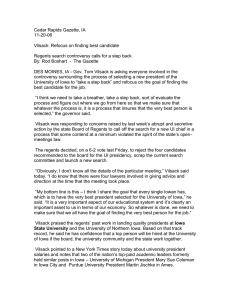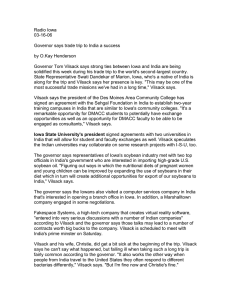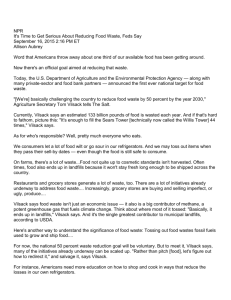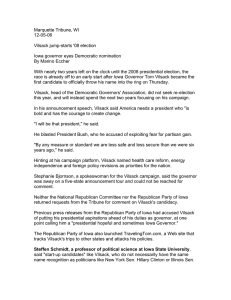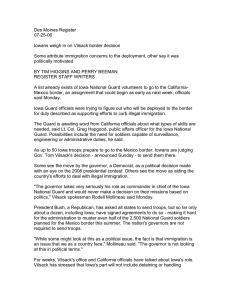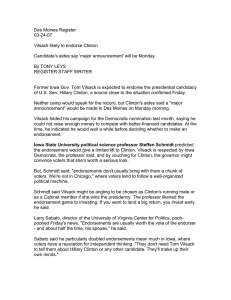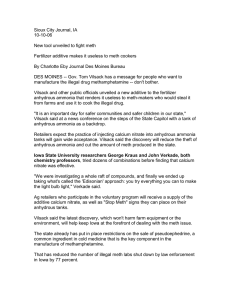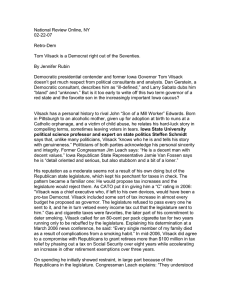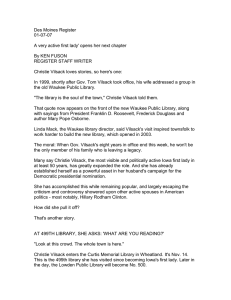Des Moines Register 12-06-06
advertisement
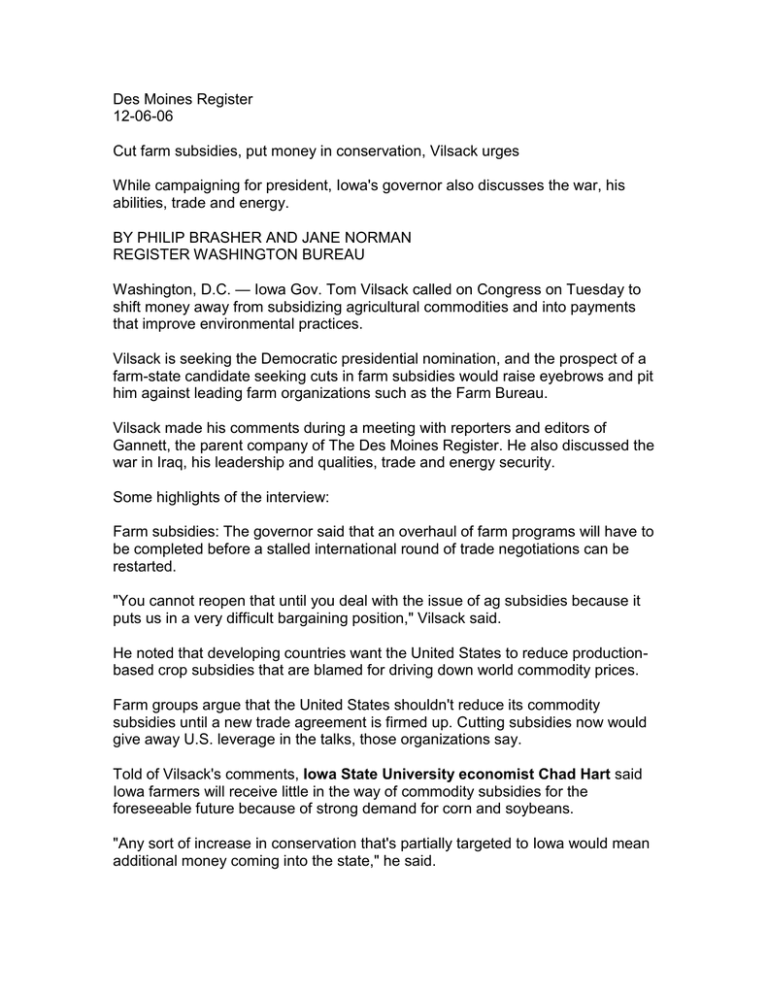
Des Moines Register 12-06-06 Cut farm subsidies, put money in conservation, Vilsack urges While campaigning for president, Iowa's governor also discusses the war, his abilities, trade and energy. BY PHILIP BRASHER AND JANE NORMAN REGISTER WASHINGTON BUREAU Washington, D.C. — Iowa Gov. Tom Vilsack called on Congress on Tuesday to shift money away from subsidizing agricultural commodities and into payments that improve environmental practices. Vilsack is seeking the Democratic presidential nomination, and the prospect of a farm-state candidate seeking cuts in farm subsidies would raise eyebrows and pit him against leading farm organizations such as the Farm Bureau. Vilsack made his comments during a meeting with reporters and editors of Gannett, the parent company of The Des Moines Register. He also discussed the war in Iraq, his leadership and qualities, trade and energy security. Some highlights of the interview: Farm subsidies: The governor said that an overhaul of farm programs will have to be completed before a stalled international round of trade negotiations can be restarted. "You cannot reopen that until you deal with the issue of ag subsidies because it puts us in a very difficult bargaining position," Vilsack said. He noted that developing countries want the United States to reduce productionbased crop subsidies that are blamed for driving down world commodity prices. Farm groups argue that the United States shouldn't reduce its commodity subsidies until a new trade agreement is firmed up. Cutting subsidies now would give away U.S. leverage in the talks, those organizations say. Told of Vilsack's comments, Iowa State University economist Chad Hart said Iowa farmers will receive little in the way of commodity subsidies for the foreseeable future because of strong demand for corn and soybeans. "Any sort of increase in conservation that's partially targeted to Iowa would mean additional money coming into the state," he said. Congress is due to write a new farm bill in 2007, with Iowa Sen. Tom Harkin, a Democrat, in charge of the Senate Agriculture Committee. Hart also said Vilsack's idea of shifting money to conservation "plays into Senator Harkin's hands" because Harkin also wants more emphasis on conservation. Iraq: Vilsack said additional members of the full-time military are needed but rejected calls by some in Congress for reinstating the draft. He said when he visited Iraq in March, he found the total number of U.S. and Iraqi forces, including police officers, was well over 400,000. But not enough U.S. troops were sent initially, he said. "It was a serious mistake among many serious mistakes made in the early days of the Iraq conflict," Vilsack said. There is a significant strain on deployed members in the National Guard reflected in divorce rates, physical and mental injuries, and disruptions to communities, he said. As for the draft, Vilsack said Iowa has been a leader in recruiting and training National Guard members because of the respect shown them and state assistance such as tuition aid and help for families of the injured. "I think it is unlikely we will have the institution of a draft, but it is more likely that we will have to look at how we care for and about our troops if we expect to increase the numbers," the governor said. Leadership: Vilsack said that in the 2006 midterm elections, Democrats were able to broaden their appeal to voters, and the question is who can replicate that in 2008. A candidate from a small town who understands rural America as well as suburbs and cities can prompt that success, he said. "There will likely be only one or two Democratic candidates west of the Mississippi, and I believe there's only one that lives on Main Street," he said meaning himself. Asked how he will compare with other governors who may enter the race, Vilsack said he has been an underdog in every race he has ever run. "That's what America is about - it's about folks climbing up that hill and challenging themselves and challenging others to join with them," he said. Under his leadership, education in Iowa has improved, access to health care increased and no state has accomplished more in renewable fuels, he said. Board of Regents: The governor declined to say much about a continuing search for a new president of the University of Iowa. Vilsack met with members of the Board of Regents after four finalists for the job were rejected. "They are going to work on it, and I am confident at the end of all this we will have a great president for a great university," he said. Trade: Future trade deals need to be linked with improvements in assistance to workers who lose their jobs when manufacturing is moved overseas, Vilsack said. "If you really truly want trade, then you've got to talk about workers and that social compact and the fact that our system doesn't address the needs of real people who are negatively impacted by trade," he said. Vilsack also said that proponents of trade liberalization do a poor job of promoting the benefit of increasing exports. The downside of trade - job losses due to plant closures - "gets a lot more ink and feeds into the anxiety that people feel about this," he said. "You have to relieve that anxiety." Energy: The government needs to change the way it subsidizes biofuels to encourage more service stations to sell them, Vilsack said. Federal tax credits for biofuels - 51 cents a gallon for ethanol and $1 a gallon for most biodiesel - should go to retailers rather than to the refiners and other companies that blend the fuels, he said. "By giving it to the retailers and suggesting they qualify for it when and if they reach a certain volume of sales, guarantees the market will expand," he said. Vilsack also has endorsed the idea of tying biofuel subsidies to the price of oil, an idea introduced in Congress this fall by Sen. Richard Lugar, R-Ind. The proposal would save taxpayers money when crude prices are relatively high, but still protect the ethanol industry against a steep drop in oil markets.
